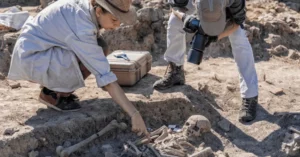AI Answer Evaluation Platform Live Now. Try Free Answer Evaluation Now
Archaeology in Israel
Israel is a land rich in history, culture, and religious significance. Archaeology in Israel is a crucial component in understanding the region’s history, cultural evolution, and religious heritage. Israel is home to numerous archaeological sites, and the country has been a hub of archaeological research for over a century. In this blog post, we will explore the significance of archaeology in Israel, the major archaeological sites in Israel, and the importance of preserving these sites.

Significance of Archaeology in Israel
Archaeology in Israel is critical in understanding the region’s history and cultural evolution. Israel is at the center of three major monotheistic religions, Judaism, Christianity, and Islam. Archaeological discoveries in Israel have provided insight into the religious practices, beliefs, and daily life of ancient civilizations, making it a unique location for archaeological research. Archaeologists in Israel have uncovered numerous artifacts that offer a glimpse into ancient civilizations, including the Canaanites, Philistines, Israelites, Romans, Byzantines, and Crusaders.
Archaeological Sites in Israel
Israel is home to numerous archaeological sites that offer insights into the country’s history, religion, and culture.
Some of the major archaeological sites in Israel are:
- Tel Aviv-Yafo: This ancient port city on the Mediterranean coast was one of the most significant cities in the ancient world. Archaeological digs in Tel Aviv-Yafo have uncovered remains of settlements dating back over 5,000 years.
- Jerusalem: Jerusalem is one of the most significant religious cities in the world and home to three major religious sites, the Western Wall, the Church of the Holy Sepulchre, and the Dome of the Rock. Archaeological discoveries in Jerusalem have provided insights into the ancient city’s political, social, and religious landscape.
- Masada: This ancient fortress on a mountain top overlooking the Dead Sea was the site of a Jewish revolt against Roman rule in the first century AD. Archaeologists have uncovered evidence of the ancient battle, including fortifications, weapons, and human remains.
- Caesarea: This ancient port city was built by Herod the Great and served as the Roman capital of Judea. Archaeologists have uncovered significant ruins, including a large amphitheater, an aqueduct, and a harbor.
Importance of Preserving Archaeological Sites
Preserving archaeological sites is essential for maintaining cultural heritage and ensuring that future generations can learn from the past. In Israel, preserving archaeological sites is especially crucial due to the country’s religious and cultural significance. Many of the archaeological sites in Israel are religious pilgrimage sites and are of great importance to people around the world.
Preserving archaeological sites also allows for ongoing research and study, providing insights into ancient civilizations and their daily lives. In addition, archaeological sites can provide economic benefits, such as tourism and cultural tourism. Preserving archaeological sites requires careful management, including site protection, monitoring, and conservation.
Conclusion
Archaeology in Israel is a critical component in understanding the region’s history, cultural evolution, and religious heritage. Israel is home to numerous archaeological sites, including Tel Aviv-Yafo, Jerusalem, Masada, and Caesarea, which offer insights into ancient civilizations, religious practices, and daily life. Preserving these sites is essential for maintaining cultural heritage, providing economic benefits, and allowing for ongoing research and study. Israel’s rich history and cultural heritage make it a unique location for archaeological research, and ongoing preservation efforts will ensure that future generations can continue to learn from the past.



